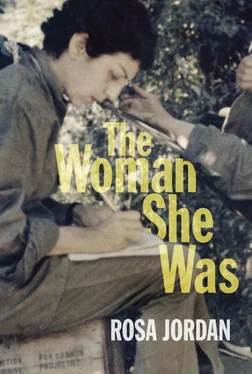Rosa Jordan
THE WOMAN SHE WAS
Dedicated to the memory of Celia Sánchez
and those Cubans still working to realize
her humanitarian vision of their homeland.
Memorial of Celia Sánchez
CELIA was sure that she had not fainted, hallucinated, nor suffered an altered state. She had simply—what? Carefully, as if reviewing a patient’s case history, she tried to reconstruct what had happened.
As on previous visits, she had first examined the small museum’s paltry exhibits: a few articles of clothing, a worn leather purse, the dented aluminium canteen that Sánchez was said to have carried during her years as a rebel leader. Then she had turned her attention to the portraits. Although done by different artists, each had rendered the face with a flatness that stripped the subject of personality. Celia guessed that this was because the paintings were copied from photographs, Sánchez having never posed for a portrait. Still, what was the matter with those men? Couldn’t they see who she was ? Celia turned away from each painting with the feeling one gets upon discovering that essential parts of an important book have been blacked out.
The museum contained not a page of Sánchez’s writings, no description of her role in bringing Cuba from under the boot of the dictator Batista, no list of the schools, hospitals, housing, and recreational facilities she had established after the war. There was not even mention of the very park in which the museum sat, Habana’s largest, which had sprung from Sánchez’s mind. She had considered it so important for city residents to have easy access to nature that she had helped plant a grove of mango trees in Parque Lenin herself. She had not lived to see how they’d grown, but as she placed seedlings in the ground she must have imagined them like the giants that now provided fruit and shade in her hometown at the eastern end of the island.
There was nothing in the one-room museum to tell a visitor those things, or much else about the woman it purported to memorialize. By its silence, history, including the officially sanctioned Fidel Castro version of history, had reduced Celia Sánchez to a pretty face—and not an honest one at that, for all of the gallery’s portraits presented her as prettier than she actually had been.
Troubled as always by what the museum did not contain, Celia had exited through the back door into the garden to see the one exhibit that did give her a sense of who the woman had been—a life-sized bronze of Sánchez as she might have appeared in her late thirties. Celia had gazed intently at the statue, then reached out to place a flower at its foot—a rose, rare in Cuba, given to her by the grateful mother of a child patient. It was then, with the suddenness of a TV turned on at top volume in a quiet room, that the silence of the garden seemed to have been shattered.
Habaneras lined the highway, cheering guerrilla fighters as they rolled into the capital. Celia turned to Fidel, sitting next to her atop the tank. A flower was flung from the crowd. He caught the blossom with a high reach, as if it were a baseball, and handed it to her. She could not hear his whisper above the rumble of the tank and cheers of the crowd but read the words on his lips: “Para ti, compañera.” Their eyes met and she was embraced by the totality of what they shared: the dreams, struggles, incalculable losses, and this euphoric moment.
Celia Cantú gave a small cry as a thorn on the rose stem pricked her. Her thumb went to her mouth and she sucked at the tiny puncture, extracting herself from something that she had felt, for an instant, she was experiencing.
Of course she had seen Castro’s triumphant 1959 arrival into Habana on television countless times; what Cuban had not? That historic film footage was not so different from what had just screened in her mind’s eye. Flowers were thrown, but she recalled no picture showing Sánchez and Castro exchanging such an intimate gaze. Indeed, she could not recall seeing Sánchez in the newsreels at all, although as the Revolutionary Armed Forces’ first commander, predating even Fidel, she must have been there.
Celia closed her eyes and tried to see the thirty-eight-year-old Sánchez as she would have appeared beside Castro when the tanks rumbled into Habana. No image came. The scene burned into her senses, even after the hallucination had passed, was from Sánchez’s point of view. Or was it her own? With absolute clarity, Celia recalled looking directly into golden-brown eyes that for a split second were looking into her own, sharing every emotional nuance.
Worried by what the incident might imply about her mental health—for it bore some resemblance to a hallucination she had had about a year earlier—she turned to leave. For a long moment she stared at the door leading back into the museum. Was she was coming or going? Hadn’t she just been here? Or was that another year? She stood there treading time as one treads water when unsure of how deep the bottom is.
“Compañera? Are you all right?”
With difficulty, Celia brought the man who had spoken into focus. He was staring at her with consternation.
“I know you,” he said. “You come every year.”
She did not know him and wondered, running fingers through her hair the way one sometimes does when trying to wake up, if she was still hallucinating. Then she noticed that he carried a rake and guessed that he was the museum’s gardener.
“Yes. I just came to see…” She gestured toward the bronze of Sánchez.
“Of course. Did you know her?”
“No.” At his look of disappointment, she added, “But my mother did. She was in the sierra with Raúl. And Celia, of course, with Fidel. I did meet her once but I was very young. All I understood was that she was called Celia too. That I was named for her.”
The gardener scrutinized her. “You have the same eyes.”
It was the sort of thing her father would have said, had in fact said. Only he had meant her mother’s eyes, not those of Celia Sánchez.
Celia Cantú smiled. “Brown?”
The gardener ignored her teasing tone. “Tender,” he said reverently. “She had the capacity to feel the pain of others. That was why she embraced the Revolution.”
He continued to look at her as fathers do when they are assessing the worthiness of their offspring. “And you? Are you a good communist?”
He must be an old revolutionary himself, Celia thought. They grew up in such serious times. She shrugged. “I’m a good doctor.”
The answer seemed to satisfy him. She smiled goodbye and took the path around the building, back to the parking lot. He followed her, walking rather too close. Perhaps he was not convinced that she really was okay. Celia was not entirely convinced herself, but she affected the purposeful stride that on normal days carried her up and down hospital corridors.
With egalitarian good manners, he did not try to open the car door for her. Celia slid in, nodded goodbye, and drove away. Just before she turned the corner she glanced in the rear-view mirror and saw that he was still staring after her—a small, muscular man in his seventies who had grown up in an era that she, barely thirty-five, seemed compelled to reinvent.
Читать дальше
















